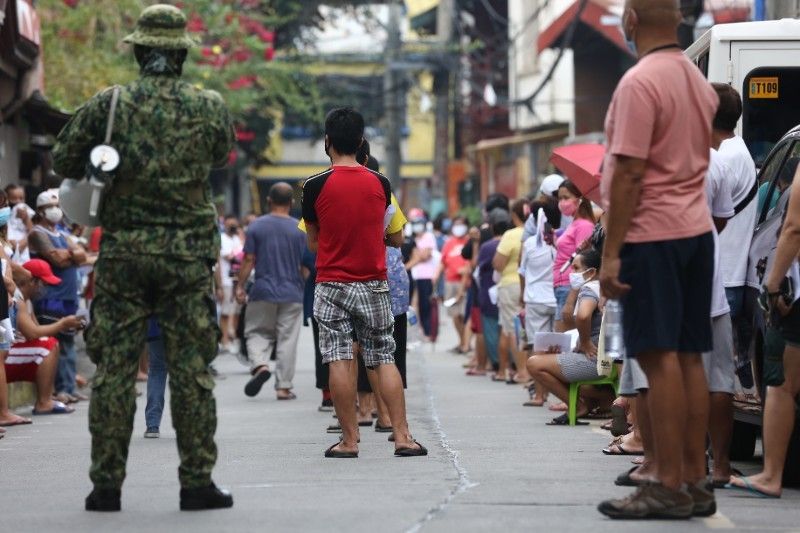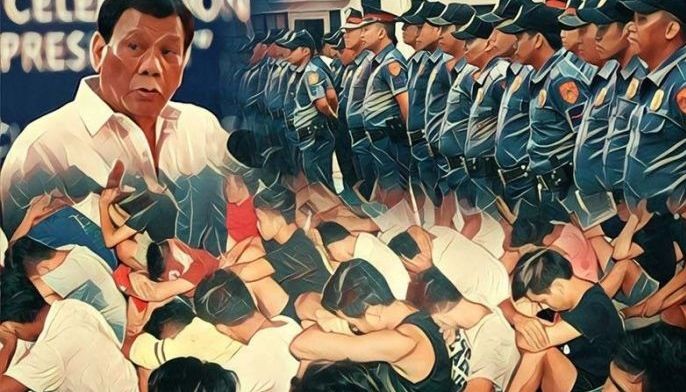Task force to mobilize cops to 'identify, monitor' residents on home quarantine

MANILA, Philippines — The enforcement arm of the government's coronavirus task force is set to mobilize the country's barangay tanods—with each barangay having its own assigned police officer to take charge of intensified quarantine enforcement on the local level, which it says is a necessary move to repel "stubborn" barangay folk they insist have grown "complacent" in following quarantine rules.
Though government officials have said that health workers and local government personnel will be sent to find patients of the coronavirus, police focal persons assigned to each barangay will be directed to conduct the "identification and monitoring of barangay residents on home quarantine if there is any," the Joint Task Force COVID Shield said in a statement issued Thursday afternoon.
READ: Health workers to lead 'Oplan Kalinga', but house-to-house ops still unclear
It is not clear if the supervisor-cops will be doing so as part of Oplan Kalinga, the government's program to "transfer" self-quarantined coronavirus patients from their homes to government quarantine facilities. Interior Secretary Eduardo Año clarified earlier that cops will only be taking part in the program in a supporting capacity "limited to assisting in transporting patients and ensuring that lockdowns are imposed."
Año previously said that cops will be going house-to-house in search of coronavirus patients under the program. The status of these plans are still unclear. While Año has retracted his earlier statement, other government agencies have also referenced a house-to-house operation.
Quarantine rules supervisors, as the task force calls them, will also be tasked to "monitor and secure health/quarantine facility in the barangay if there is any."
It is not clear what threat they will be securing these facilities from.
READ: Confusion stirs amid conflicting statements on 'house-to-house' search for COVID-19 patients
Among the roles the QRS are expected to fulfill as listed in the PNP memorandum are:
- Supervise the Quarantine Control Points in the barangays to ensure proper implementation of quarantine protocols;
- Coordinate with the Punong Barangay for the implementation of the existing PNP-LGU arrangements/agreements to the implementation of the localized community quarantine protocols and guidelines for COVID-19 cases at the barangay level;
- Continuous enforcement of local ordinances such as curfew and liquor ban;
- Support contact tracing teams of the barangay;
- Facilitate cascading of the guidelines that will be issued for effective enforcement of quarantine rules at the barangay level; and
- Regular assessment/evaluation of the situation in the barangay, and further come up with ready recommendations relative to quarantine protocols and implementation.
As it stands, the Philippine National Police has led and assisted contact tracing efforts with local governments since mid-April.
The memorandum also mentions the "strict enforcement of quarantine rules through the implementation of minimum health standard protocols" including physical distancing, wearing face masks, "personal hygiene etiquette," temperature scanning, monitoring the capacity in the permitted establishments and vehicle passenger loads, and banning mass gathering "including drinking session and gossiping on the streets and especially in public markets and other places of convergence."
Since the beginning of July, the national police has trended towards tighter enforcement of local ordinances—including bans on loitering, drinking and smoking—to further clamp down on quarantine violators. The agency has also called on private security to aid its efforts to "intensify enforcement" amid the coronavirus-induced quarantine.
Misplaced militarism?
“The designation of QRS, or the PNP’s COVID Focal Persons, in every barangay in the country will help strengthen our fight to prevent the spread and further transmission of the coronavirus by making sure that the minimum health standard protocols would be properly and strictly enforced down to the barangay level,” said Police Lt. Gen. Guillermo Elezar, commander of the JTF CV Shield.
READ: 'War' narrative in COVID-19 crisis fails to empower Filipinos, groups say
With policemen themselves leading the barangay and local government personnel, Eleazar stressed in an earlier statement that this "would send a strong message to every member of the community that they should conform and adhere to the quarantine rules, or face the consequences of their complacency or hardheadedness."
When the task force opted to deploy hundreds of fully-armed special commandos with armored vehicles to assist in the enforcement of Metro Cebu's enhanced community quarantine, Eleazar said it was "a tried-and-tested formula in the enforcement of quarantine rules."
In a webinar on Saturday, housing advocate group Karapatan ang Tahanan's officer Vincent Eugenio said: "The government has been brutal in enforcing COVID-19 protocols in the urban poor communities. Instead of creating an environment, wherein the people would be encouraged to have themselves tested, the agents of the government have made them feel the opposite. We urge the government to change its military approach in handling the pandemic, since it intimidates the public."
Rights activists have said that the "war" narrative against the coronavirus is an intentional move, saying this encourages dependence on the military and highlights their role in maintaining peace and order. Duterte's constant praise for the military and police has been paired with officials repeatedly characterizing Filipinos as "pasaway", or stubborn, all in a time when medical solutions are what lawmakers say is needed.
Cases of police personnel violating protocols piled up quickly up amid the enforcement of both the general and enhanced community quarantines.
RELATED: 'By the book': A look at quarantine incidents and police operational procedures | Students allege harassment, procedural violations in Iligan City protest arrests
During his April 13 public address at the earlier days of the enhanced community quarantine, President Rodrigo Duterte was quoted as saying, "I think we will win this war. And I’m sure that with our three veteran generals who are now implementing this whole execution, and I believe that in the end, you can have a great plan." At his fifth State of the Nation Address, he also made sure to thank law enforcement personnel within the opening minutes for, he said, keeping Filipinos safe amid the coronavirus pandemic.
“We in the JTF COVID Shield believes that our strength as a nation to defeat the COVID-19 depends on the cooperation and partnership of all the sectors concerned. With the PNP and the LGUs down to the barangay level now working together, we are confident that this will contribute a lot in combating the spread of the virus. Let us work together to win as one, and to heal as one,” he added.
- Latest
- Trending


































